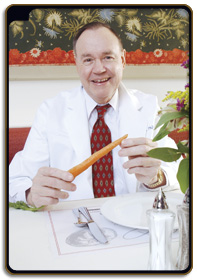Center for Human Nutrition serves up a quarter-century of well-balanced discoveries

Dr. Scott Grundy
For more than a quarter-century, investigators at the Center for Human Nutrition at UT Southwestern Medical Center have made key discoveries that have expanded our understanding of the role nutrition plays in the prevention and treatment of chronic conditions such as heart disease, hypertension, diabetes and cancer.
- The Center, led by Dr. Scott Grundy, conducted some of the first tests on the effectiveness of statin medications to lower cholesterol levels.
- It popularized lifestyle choices like the Mediterranean diet that emphasize cooking with olive oil, fresh fruits and vegetables.
- Center investigators have been at the forefront of public policy. Dr. Grundy twice chaired the National Cholesterol Education Program Expert Panel on Detection,
Evaluation and Treatment of High Blood Cholesterol in Adults, which helped set guidelines for physicians on measuring and treating low-density lipoproteins, the primary cause of atherosclerosis.
- The Center's research has influenced the development of numerous national guidelines, notably the determination of safe and unsafe dietary fats and the importance of weight loss and exercise for reducing cardiovascular risk.
- Center investigators also have been influential in requiring food manufacturers to identify components of packaged food, particularly trans-unsaturated fats.
- Recently, the Center has carried out extensive research on the metabolic syndrome as a risk factor for cardiovascular disease and diabetes.
These successes were made possible thanks, in large part, to a Dallas-based foundation that has consistently supported the Center's endeavors, contributing more than $14.5 million. The UTIMCO-administered funds now have a market value of more than $22 million.
The Center also has received substantial support through the years from a number of foundations, corporations and individuals, including the Dr. Robert C. and Veronica Atkins Foundation, Cargill Higher Education Fund, Harry S. Moss Trust for the Prevention and Cure of Heart Disease, and Dallas civic leaders Vin and Caren Prothro. The National Institutes of Health, most recently through the Obesity Research Task Force, also has contributed significantly to the work of the Center.
Dr. Grundy has been at the helm of the Center since its inception in 1981. Holder of the Distinguished Chair in Human Nutrition, he also serves as chairman of clinical nutrition at UT Southwestern School of Health Professions and chief of the metabolic unit at the Dallas Veterans Affairs Medical Center. Dr. Grundy was honored in May with the Gold Heart Award, the highest honor the American Heart Association gives to volunteers who have provided continued distinguished service.
"Dr. Grundy is a marvelous mentor to his associates," Peter O'Donnell, founder of the Friends of the Center for Human Nutrition, said upon the Center's 25th anniversary in 2006. "He has developed whole new generations of human nutrition researchers."
The Friends group evolved along with the Center early on as a way to organize, fund and advocate nutrition research and discoveries. The group raises approximately $150,000 annually for research and education.
"By funding the salaries of many of our research fellows, the Friends deserve enormous credit for their contribution to the development of the academic careers of today's and tomorrow's nutrition scientists," Dr. Grundy said.
Dr. Daniel K. Podolsky, president of UT Southwestern, said, "The long history of generosity the Center for Human Nutrition has received has allowed us to make life better for the people of our community, our nation and the world. Good nutrition is one of the most cost-effective ways to improve overall health of patients."